Sustainable Tourism Development in Antalya
VerifiedAdded on 2020/01/07
|17
|2749
|180
Literature Review
AI Summary
This assignment analyzes the role of collaborative networks and organizational building in promoting sustainable tourism development within the Antalya region. It delves into relevant academic literature, including works by Evans et al., Goeldner & Ritchie, Heung et al., Kimbu & Ngoasong, Látková & Vogt, Medlik, Moutinho, Mowforth & Munt, Peeters & Dubois, Saha & Yap, Seetanah, Telfer & Sharpley, Wang et al., and Webster & Ivanov. The assignment examines various aspects of sustainable tourism development, considering factors such as economic impact, environmental sustainability, community engagement, and the influence of external factors like political instability and climate change.
Contribute Materials
Your contribution can guide someone’s learning journey. Share your
documents today.
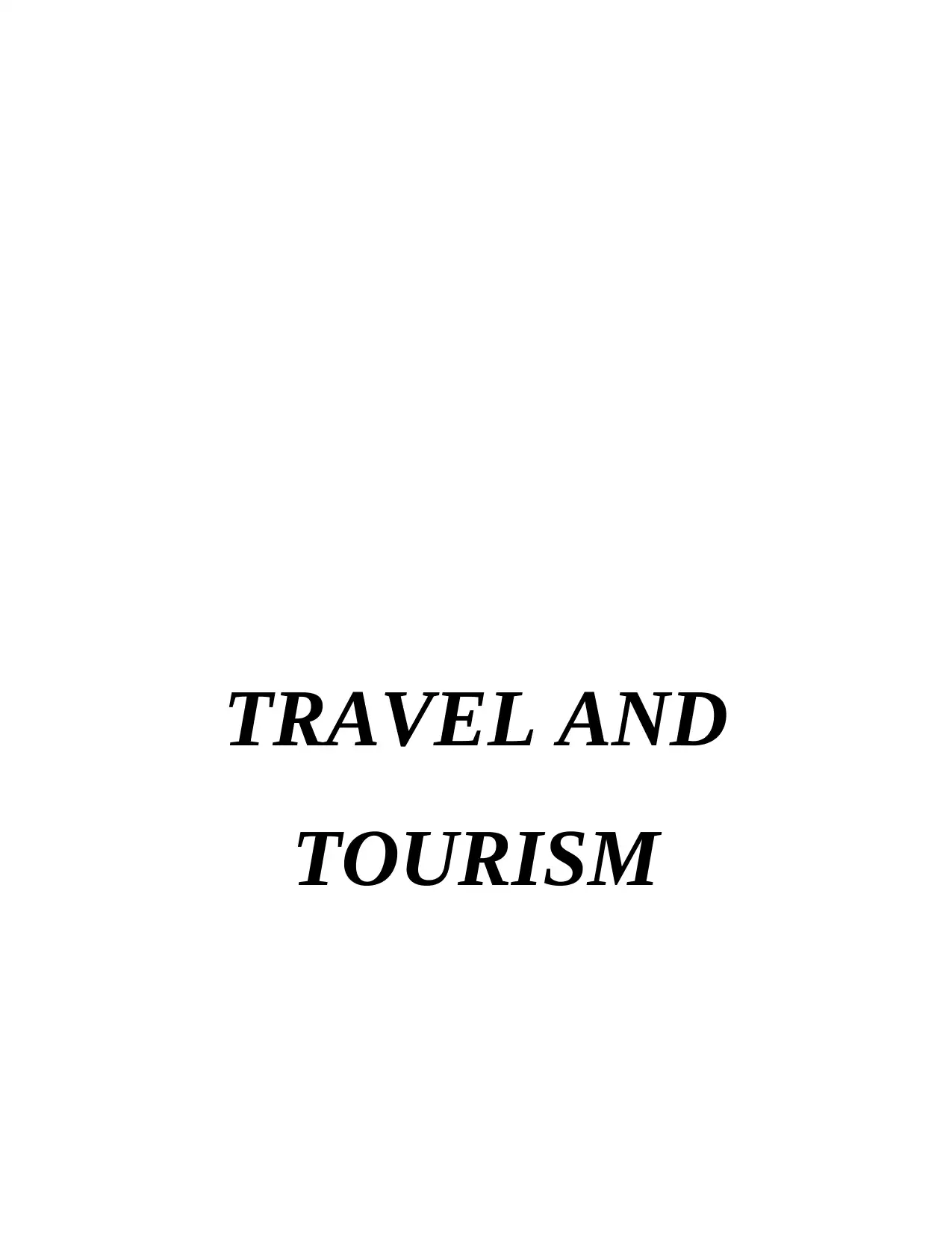
TRAVEL AND
TOURISM
TOURISM
Secure Best Marks with AI Grader
Need help grading? Try our AI Grader for instant feedback on your assignments.
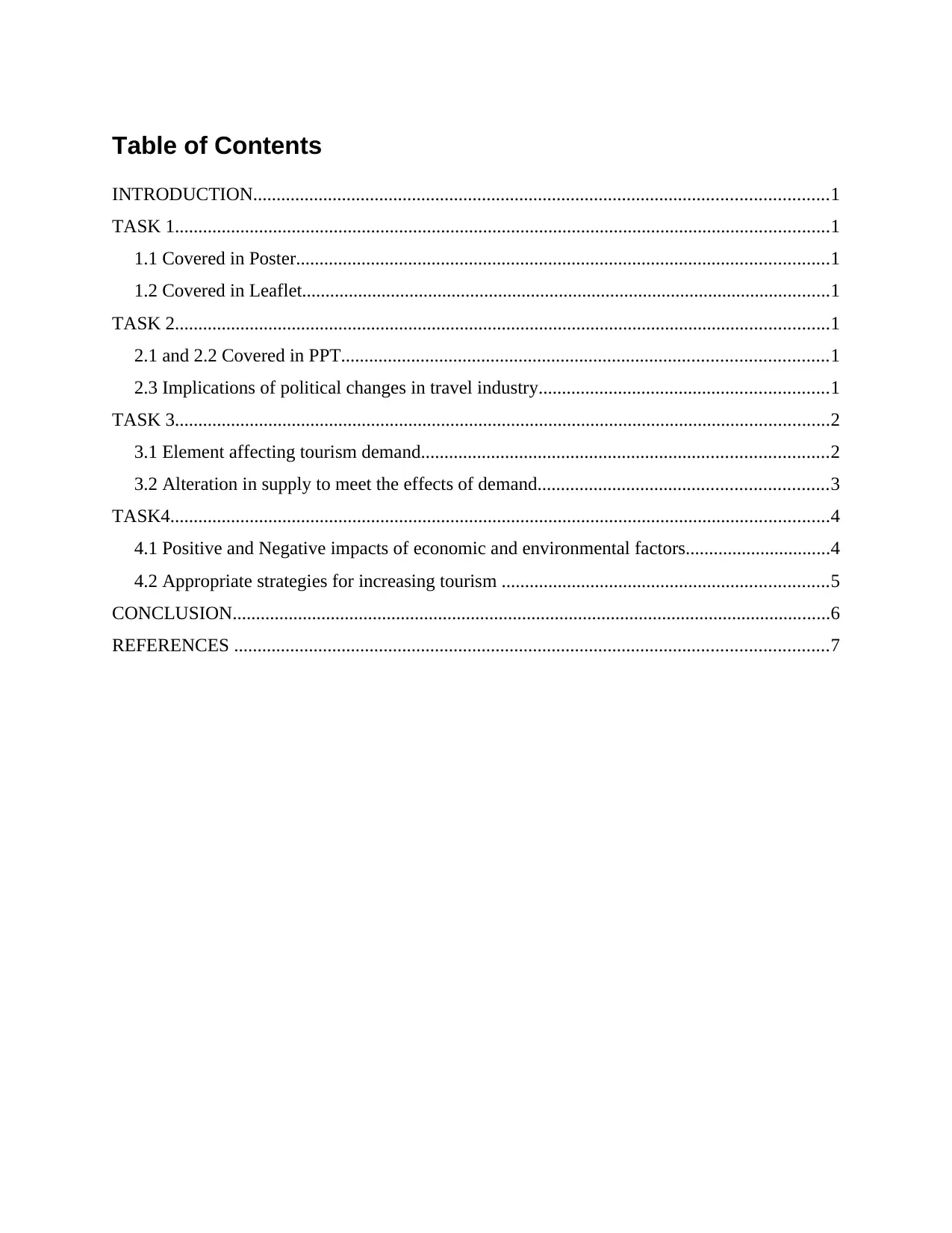
Table of Contents
INTRODUCTION...........................................................................................................................1
TASK 1............................................................................................................................................1
1.1 Covered in Poster..................................................................................................................1
1.2 Covered in Leaflet.................................................................................................................1
TASK 2............................................................................................................................................1
2.1 and 2.2 Covered in PPT........................................................................................................1
2.3 Implications of political changes in travel industry..............................................................1
TASK 3............................................................................................................................................2
3.1 Element affecting tourism demand.......................................................................................2
3.2 Alteration in supply to meet the effects of demand..............................................................3
TASK4.............................................................................................................................................4
4.1 Positive and Negative impacts of economic and environmental factors...............................4
4.2 Appropriate strategies for increasing tourism ......................................................................5
CONCLUSION................................................................................................................................6
REFERENCES ...............................................................................................................................7
INTRODUCTION...........................................................................................................................1
TASK 1............................................................................................................................................1
1.1 Covered in Poster..................................................................................................................1
1.2 Covered in Leaflet.................................................................................................................1
TASK 2............................................................................................................................................1
2.1 and 2.2 Covered in PPT........................................................................................................1
2.3 Implications of political changes in travel industry..............................................................1
TASK 3............................................................................................................................................2
3.1 Element affecting tourism demand.......................................................................................2
3.2 Alteration in supply to meet the effects of demand..............................................................3
TASK4.............................................................................................................................................4
4.1 Positive and Negative impacts of economic and environmental factors...............................4
4.2 Appropriate strategies for increasing tourism ......................................................................5
CONCLUSION................................................................................................................................6
REFERENCES ...............................................................................................................................7
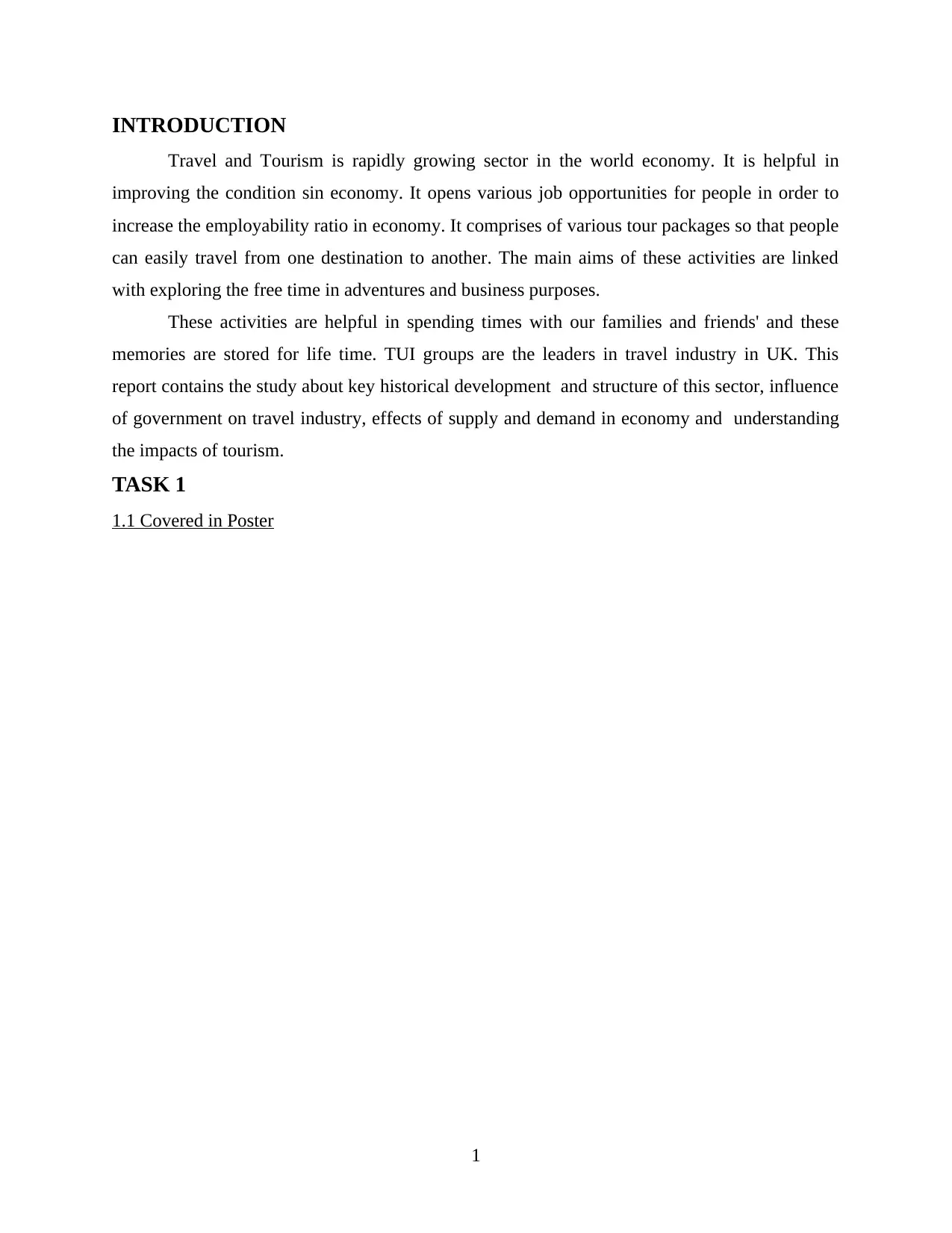
INTRODUCTION
Travel and Tourism is rapidly growing sector in the world economy. It is helpful in
improving the condition sin economy. It opens various job opportunities for people in order to
increase the employability ratio in economy. It comprises of various tour packages so that people
can easily travel from one destination to another. The main aims of these activities are linked
with exploring the free time in adventures and business purposes.
These activities are helpful in spending times with our families and friends' and these
memories are stored for life time. TUI groups are the leaders in travel industry in UK. This
report contains the study about key historical development and structure of this sector, influence
of government on travel industry, effects of supply and demand in economy and understanding
the impacts of tourism.
TASK 1
1.1 Covered in Poster
1
Travel and Tourism is rapidly growing sector in the world economy. It is helpful in
improving the condition sin economy. It opens various job opportunities for people in order to
increase the employability ratio in economy. It comprises of various tour packages so that people
can easily travel from one destination to another. The main aims of these activities are linked
with exploring the free time in adventures and business purposes.
These activities are helpful in spending times with our families and friends' and these
memories are stored for life time. TUI groups are the leaders in travel industry in UK. This
report contains the study about key historical development and structure of this sector, influence
of government on travel industry, effects of supply and demand in economy and understanding
the impacts of tourism.
TASK 1
1.1 Covered in Poster
1
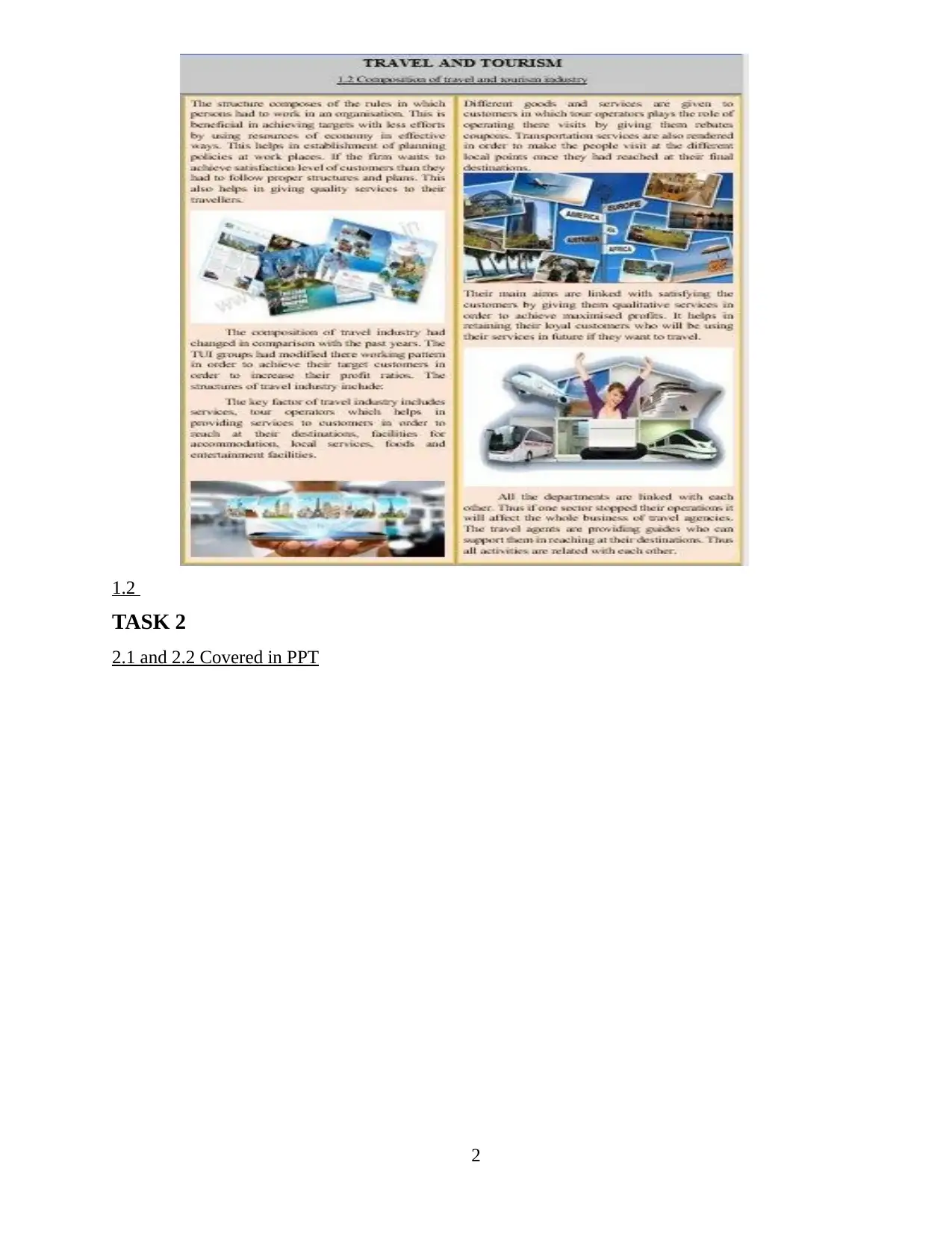
1.2
TASK 2
2.1 and 2.2 Covered in PPT
2
TASK 2
2.1 and 2.2 Covered in PPT
2
Secure Best Marks with AI Grader
Need help grading? Try our AI Grader for instant feedback on your assignments.
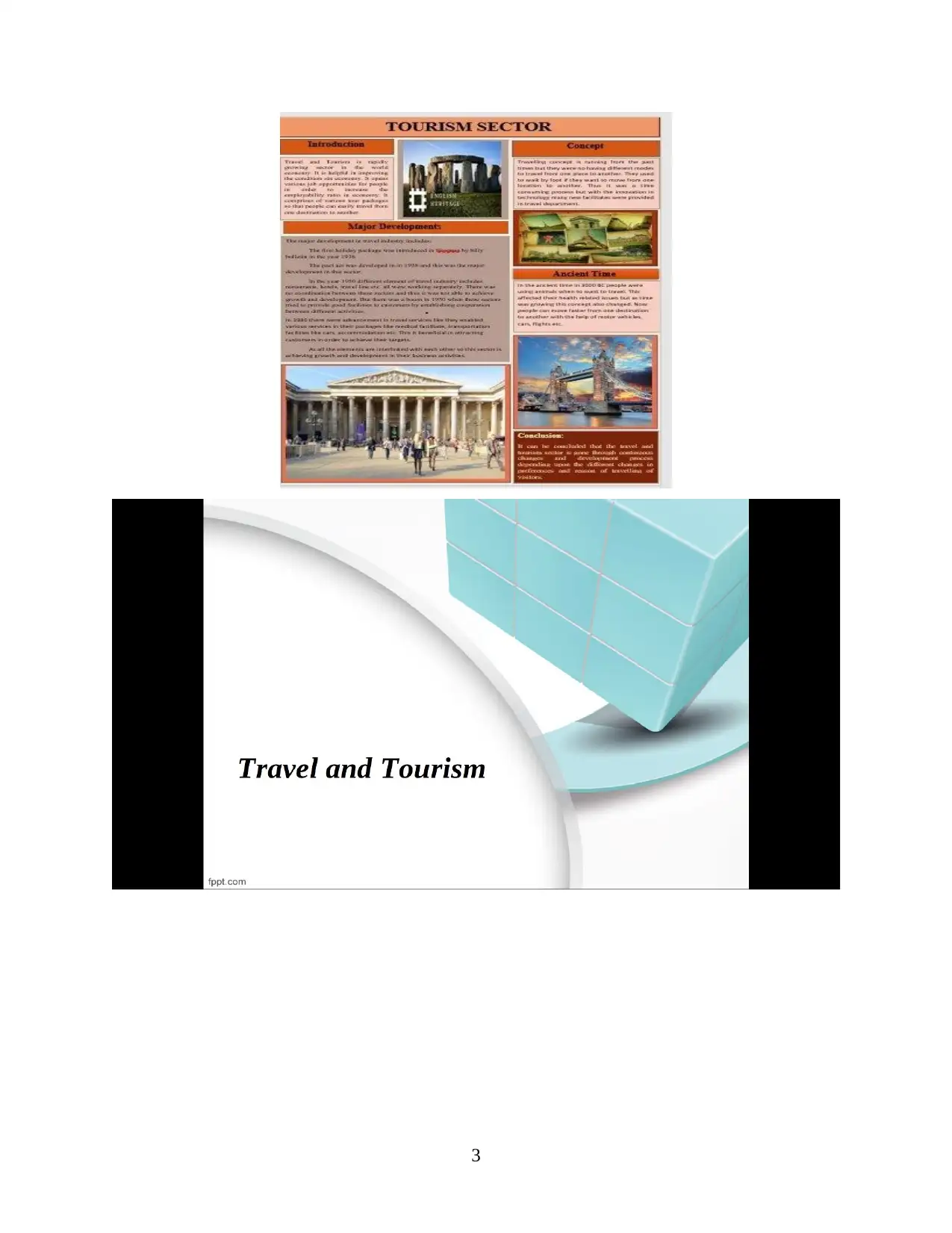
3
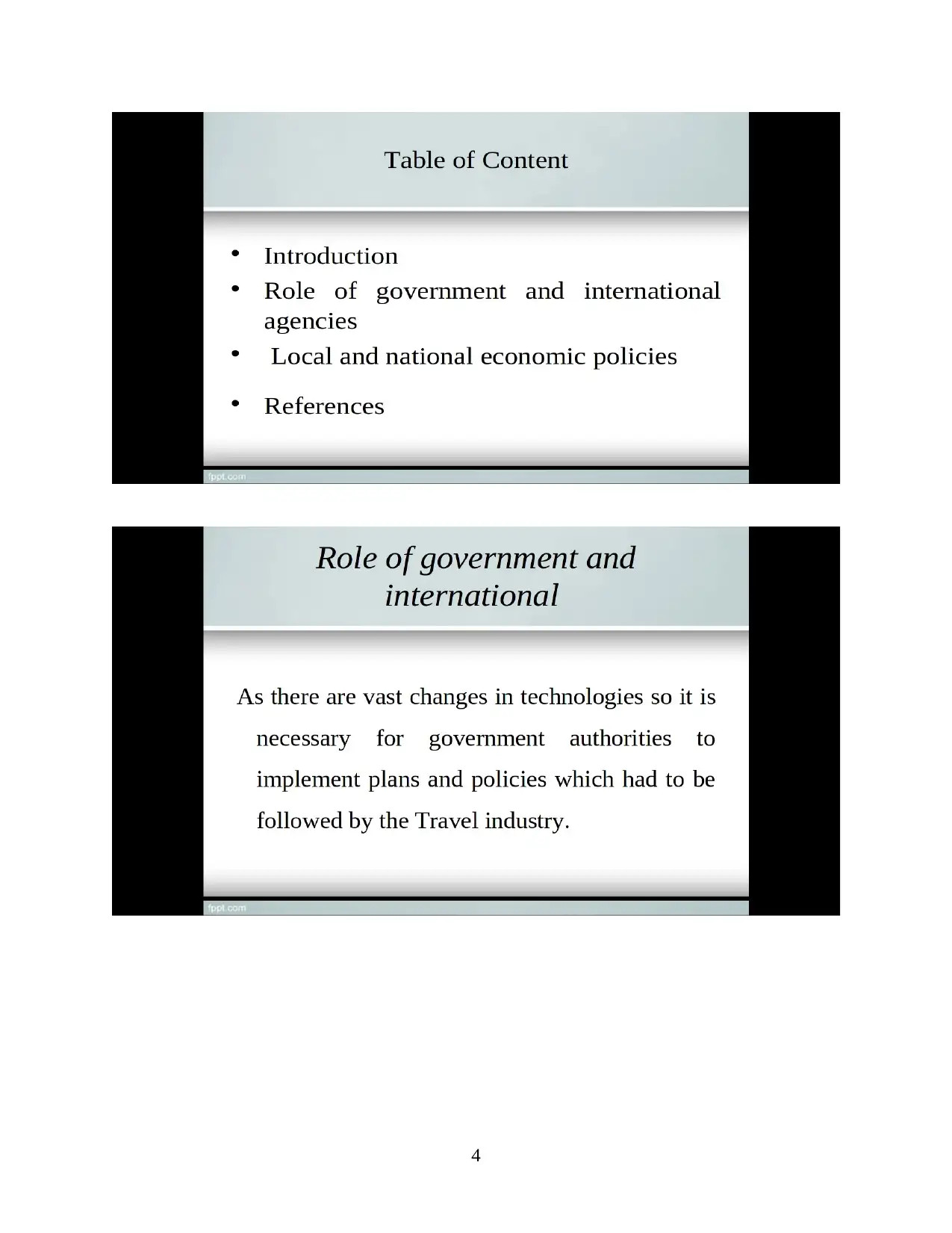
4
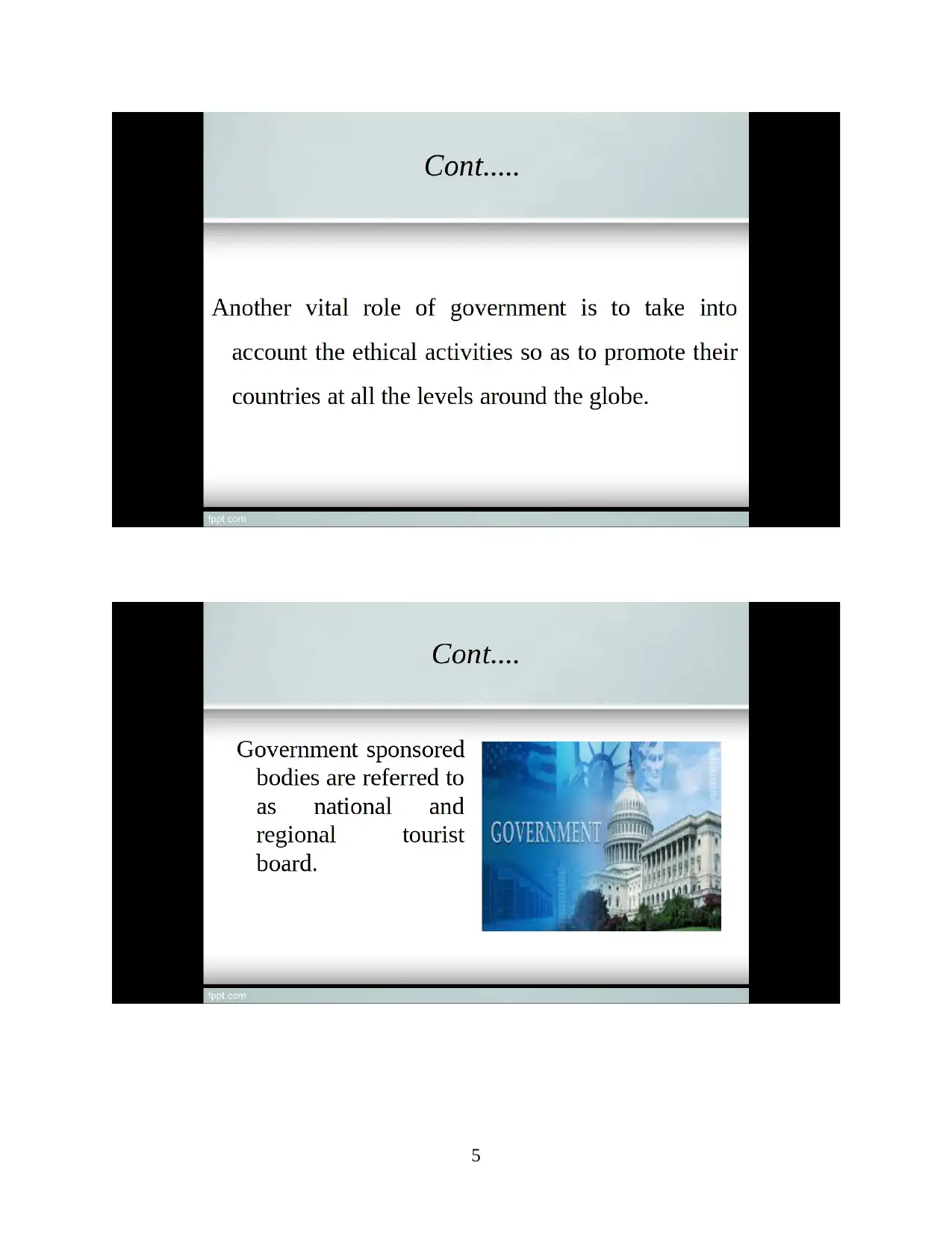
5
Paraphrase This Document
Need a fresh take? Get an instant paraphrase of this document with our AI Paraphraser
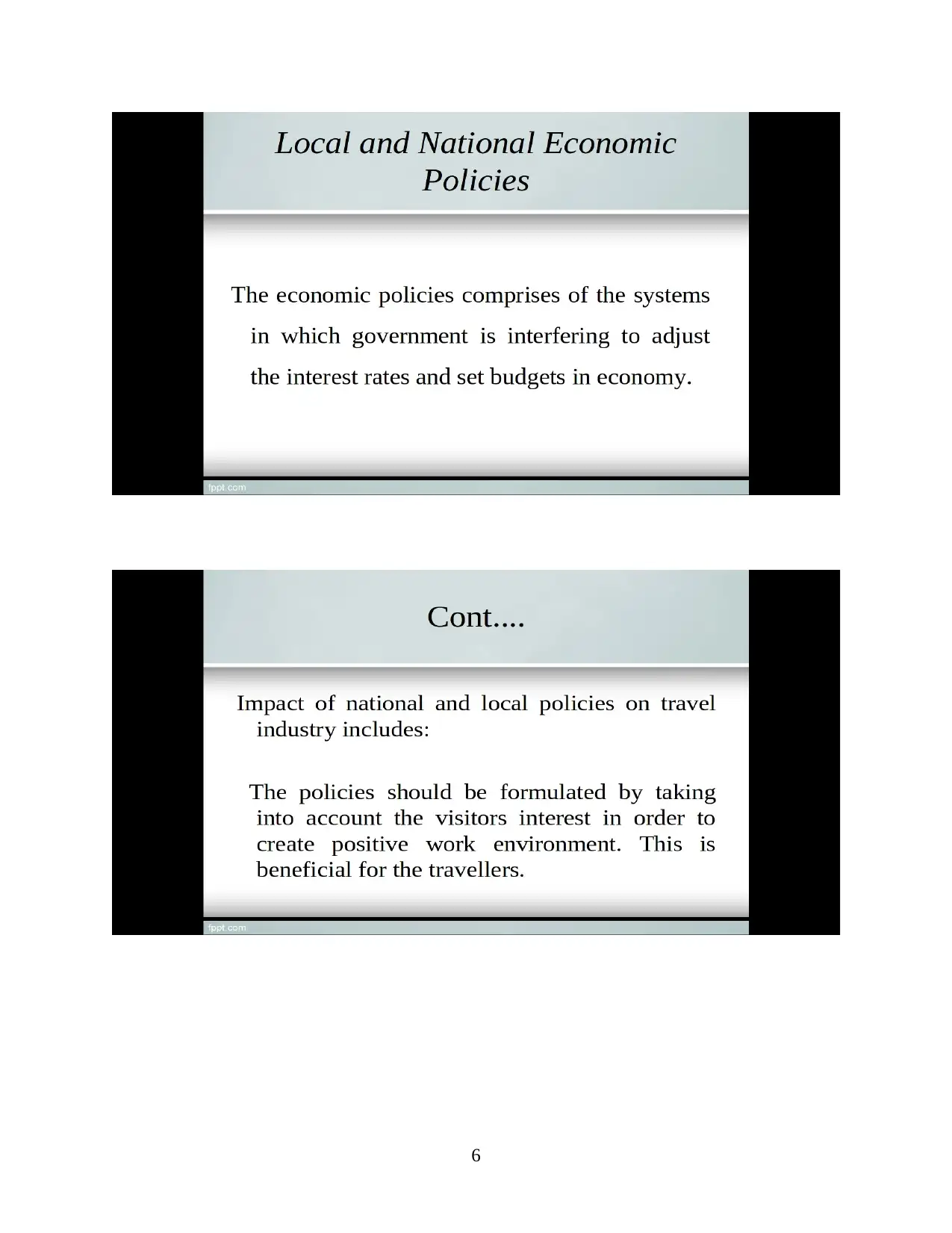
6
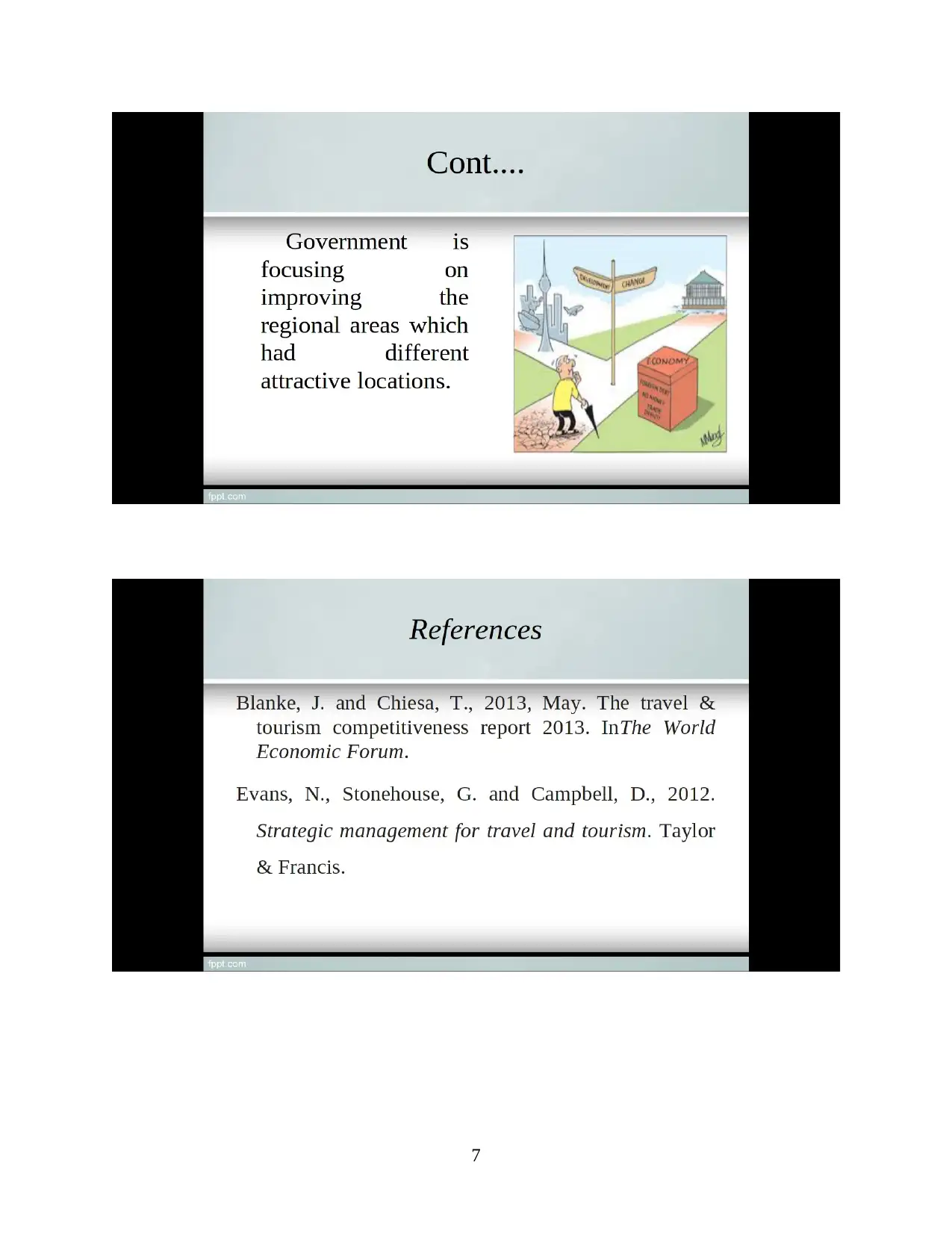
7
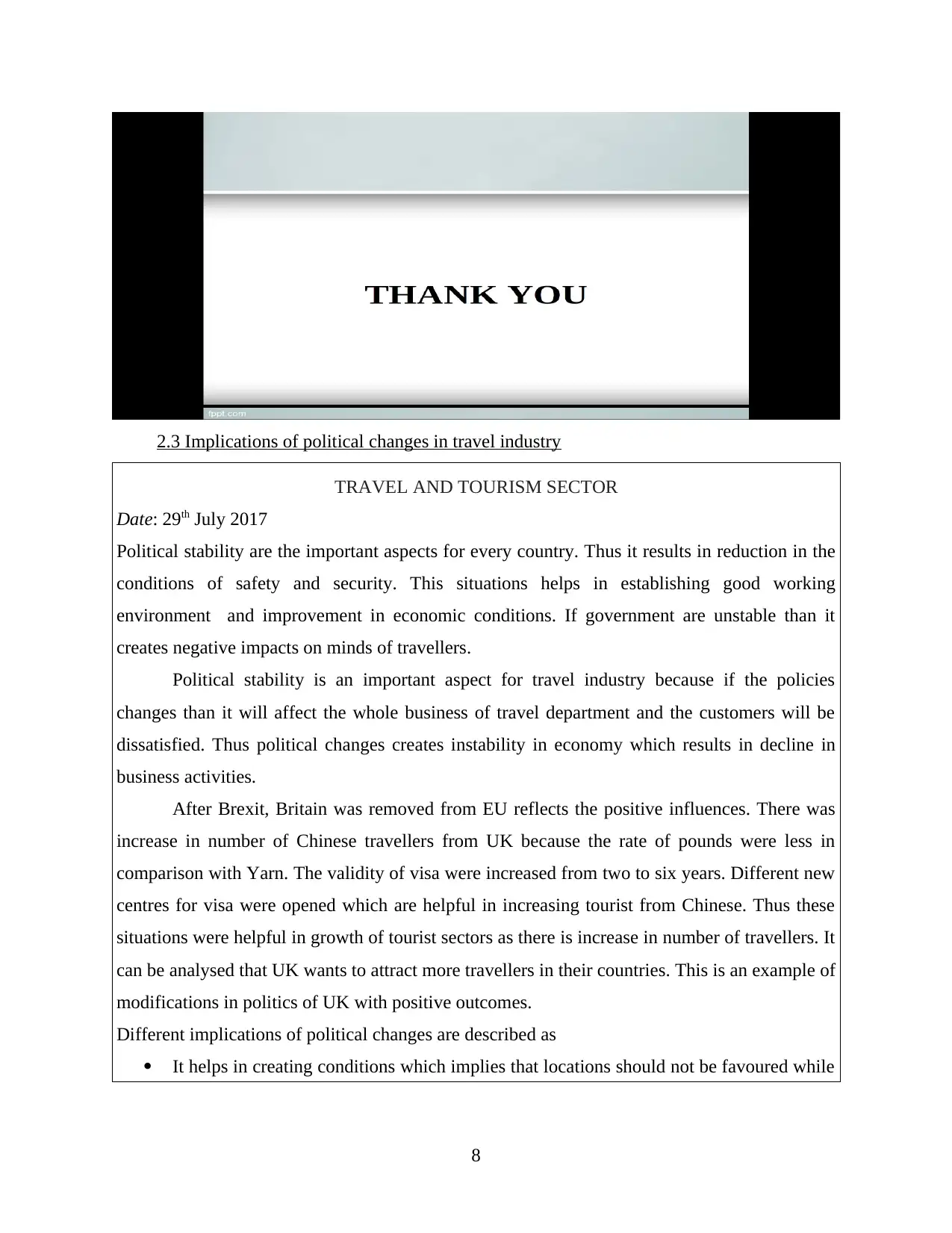
2.3 Implications of political changes in travel industry
TRAVEL AND TOURISM SECTOR
Date: 29th July 2017
Political stability are the important aspects for every country. Thus it results in reduction in the
conditions of safety and security. This situations helps in establishing good working
environment and improvement in economic conditions. If government are unstable than it
creates negative impacts on minds of travellers.
Political stability is an important aspect for travel industry because if the policies
changes than it will affect the whole business of travel department and the customers will be
dissatisfied. Thus political changes creates instability in economy which results in decline in
business activities.
After Brexit, Britain was removed from EU reflects the positive influences. There was
increase in number of Chinese travellers from UK because the rate of pounds were less in
comparison with Yarn. The validity of visa were increased from two to six years. Different new
centres for visa were opened which are helpful in increasing tourist from Chinese. Thus these
situations were helpful in growth of tourist sectors as there is increase in number of travellers. It
can be analysed that UK wants to attract more travellers in their countries. This is an example of
modifications in politics of UK with positive outcomes.
Different implications of political changes are described as
It helps in creating conditions which implies that locations should not be favoured while
8
TRAVEL AND TOURISM SECTOR
Date: 29th July 2017
Political stability are the important aspects for every country. Thus it results in reduction in the
conditions of safety and security. This situations helps in establishing good working
environment and improvement in economic conditions. If government are unstable than it
creates negative impacts on minds of travellers.
Political stability is an important aspect for travel industry because if the policies
changes than it will affect the whole business of travel department and the customers will be
dissatisfied. Thus political changes creates instability in economy which results in decline in
business activities.
After Brexit, Britain was removed from EU reflects the positive influences. There was
increase in number of Chinese travellers from UK because the rate of pounds were less in
comparison with Yarn. The validity of visa were increased from two to six years. Different new
centres for visa were opened which are helpful in increasing tourist from Chinese. Thus these
situations were helpful in growth of tourist sectors as there is increase in number of travellers. It
can be analysed that UK wants to attract more travellers in their countries. This is an example of
modifications in politics of UK with positive outcomes.
Different implications of political changes are described as
It helps in creating conditions which implies that locations should not be favoured while
8
Secure Best Marks with AI Grader
Need help grading? Try our AI Grader for instant feedback on your assignments.
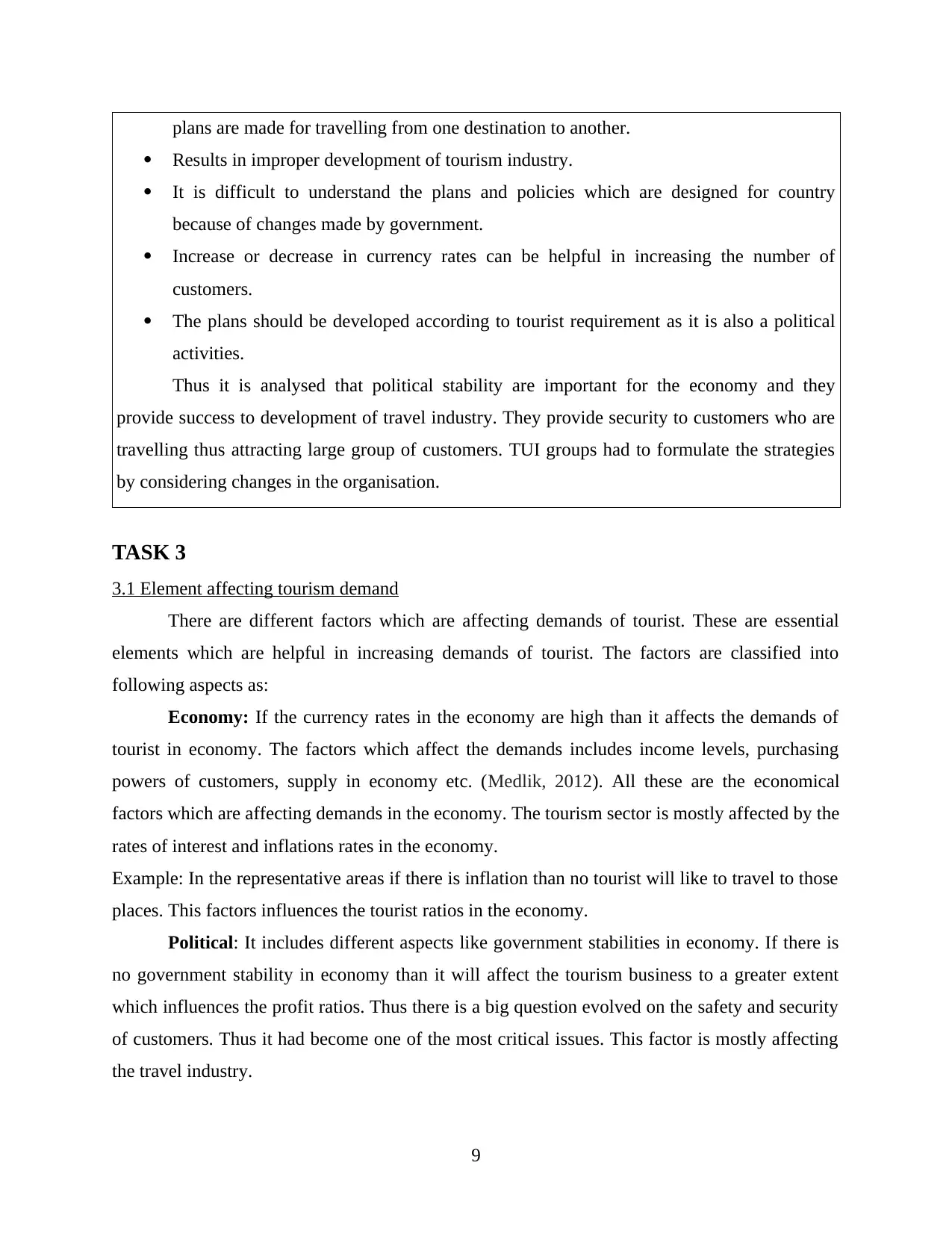
plans are made for travelling from one destination to another.
Results in improper development of tourism industry.
It is difficult to understand the plans and policies which are designed for country
because of changes made by government.
Increase or decrease in currency rates can be helpful in increasing the number of
customers.
The plans should be developed according to tourist requirement as it is also a political
activities.
Thus it is analysed that political stability are important for the economy and they
provide success to development of travel industry. They provide security to customers who are
travelling thus attracting large group of customers. TUI groups had to formulate the strategies
by considering changes in the organisation.
TASK 3
3.1 Element affecting tourism demand
There are different factors which are affecting demands of tourist. These are essential
elements which are helpful in increasing demands of tourist. The factors are classified into
following aspects as:
Economy: If the currency rates in the economy are high than it affects the demands of
tourist in economy. The factors which affect the demands includes income levels, purchasing
powers of customers, supply in economy etc. (Medlik, 2012). All these are the economical
factors which are affecting demands in the economy. The tourism sector is mostly affected by the
rates of interest and inflations rates in the economy.
Example: In the representative areas if there is inflation than no tourist will like to travel to those
places. This factors influences the tourist ratios in the economy.
Political: It includes different aspects like government stabilities in economy. If there is
no government stability in economy than it will affect the tourism business to a greater extent
which influences the profit ratios. Thus there is a big question evolved on the safety and security
of customers. Thus it had become one of the most critical issues. This factor is mostly affecting
the travel industry.
9
Results in improper development of tourism industry.
It is difficult to understand the plans and policies which are designed for country
because of changes made by government.
Increase or decrease in currency rates can be helpful in increasing the number of
customers.
The plans should be developed according to tourist requirement as it is also a political
activities.
Thus it is analysed that political stability are important for the economy and they
provide success to development of travel industry. They provide security to customers who are
travelling thus attracting large group of customers. TUI groups had to formulate the strategies
by considering changes in the organisation.
TASK 3
3.1 Element affecting tourism demand
There are different factors which are affecting demands of tourist. These are essential
elements which are helpful in increasing demands of tourist. The factors are classified into
following aspects as:
Economy: If the currency rates in the economy are high than it affects the demands of
tourist in economy. The factors which affect the demands includes income levels, purchasing
powers of customers, supply in economy etc. (Medlik, 2012). All these are the economical
factors which are affecting demands in the economy. The tourism sector is mostly affected by the
rates of interest and inflations rates in the economy.
Example: In the representative areas if there is inflation than no tourist will like to travel to those
places. This factors influences the tourist ratios in the economy.
Political: It includes different aspects like government stabilities in economy. If there is
no government stability in economy than it will affect the tourism business to a greater extent
which influences the profit ratios. Thus there is a big question evolved on the safety and security
of customers. Thus it had become one of the most critical issues. This factor is mostly affecting
the travel industry.
9
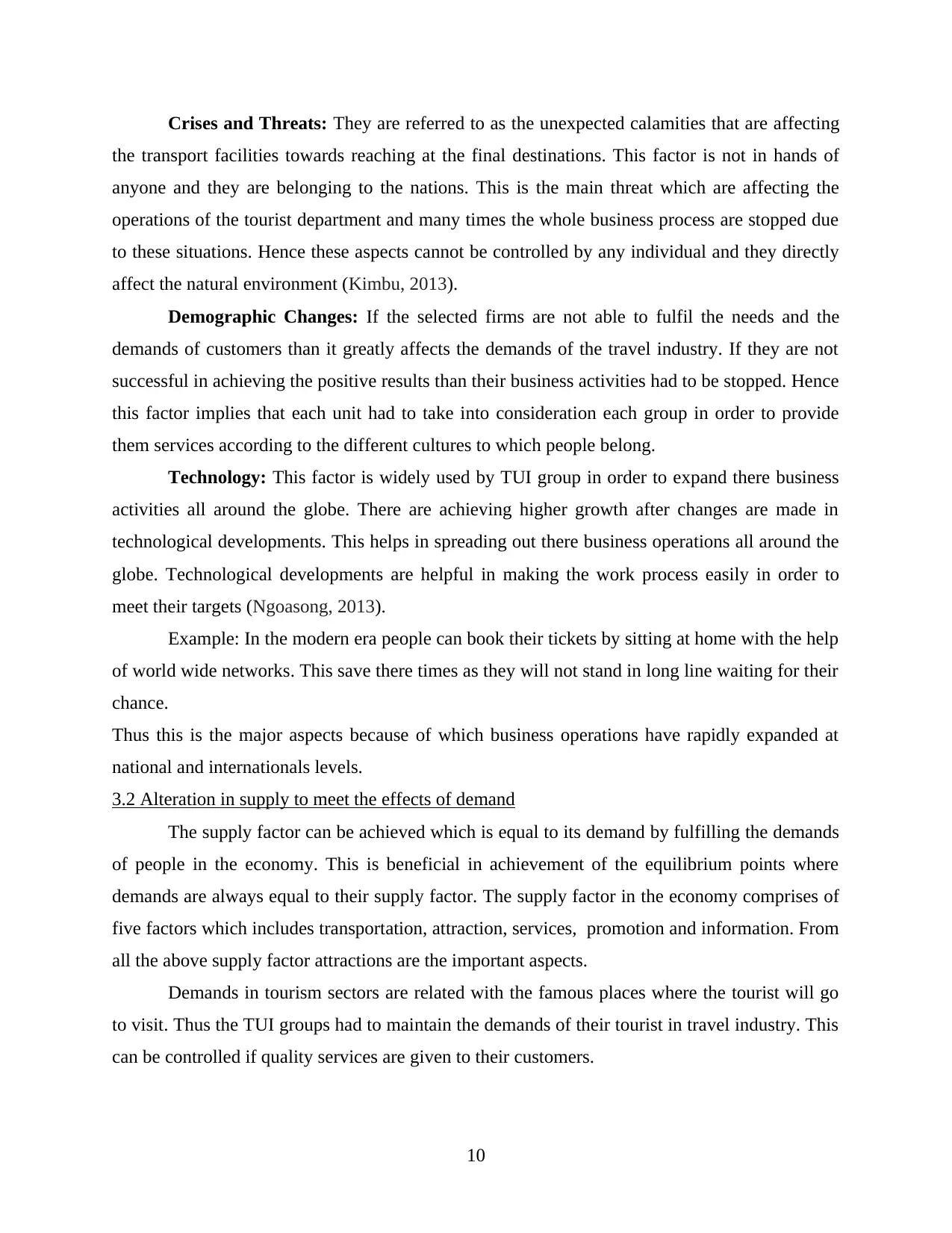
Crises and Threats: They are referred to as the unexpected calamities that are affecting
the transport facilities towards reaching at the final destinations. This factor is not in hands of
anyone and they are belonging to the nations. This is the main threat which are affecting the
operations of the tourist department and many times the whole business process are stopped due
to these situations. Hence these aspects cannot be controlled by any individual and they directly
affect the natural environment (Kimbu, 2013).
Demographic Changes: If the selected firms are not able to fulfil the needs and the
demands of customers than it greatly affects the demands of the travel industry. If they are not
successful in achieving the positive results than their business activities had to be stopped. Hence
this factor implies that each unit had to take into consideration each group in order to provide
them services according to the different cultures to which people belong.
Technology: This factor is widely used by TUI group in order to expand there business
activities all around the globe. There are achieving higher growth after changes are made in
technological developments. This helps in spreading out there business operations all around the
globe. Technological developments are helpful in making the work process easily in order to
meet their targets (Ngoasong, 2013).
Example: In the modern era people can book their tickets by sitting at home with the help
of world wide networks. This save there times as they will not stand in long line waiting for their
chance.
Thus this is the major aspects because of which business operations have rapidly expanded at
national and internationals levels.
3.2 Alteration in supply to meet the effects of demand
The supply factor can be achieved which is equal to its demand by fulfilling the demands
of people in the economy. This is beneficial in achievement of the equilibrium points where
demands are always equal to their supply factor. The supply factor in the economy comprises of
five factors which includes transportation, attraction, services, promotion and information. From
all the above supply factor attractions are the important aspects.
Demands in tourism sectors are related with the famous places where the tourist will go
to visit. Thus the TUI groups had to maintain the demands of their tourist in travel industry. This
can be controlled if quality services are given to their customers.
10
the transport facilities towards reaching at the final destinations. This factor is not in hands of
anyone and they are belonging to the nations. This is the main threat which are affecting the
operations of the tourist department and many times the whole business process are stopped due
to these situations. Hence these aspects cannot be controlled by any individual and they directly
affect the natural environment (Kimbu, 2013).
Demographic Changes: If the selected firms are not able to fulfil the needs and the
demands of customers than it greatly affects the demands of the travel industry. If they are not
successful in achieving the positive results than their business activities had to be stopped. Hence
this factor implies that each unit had to take into consideration each group in order to provide
them services according to the different cultures to which people belong.
Technology: This factor is widely used by TUI group in order to expand there business
activities all around the globe. There are achieving higher growth after changes are made in
technological developments. This helps in spreading out there business operations all around the
globe. Technological developments are helpful in making the work process easily in order to
meet their targets (Ngoasong, 2013).
Example: In the modern era people can book their tickets by sitting at home with the help
of world wide networks. This save there times as they will not stand in long line waiting for their
chance.
Thus this is the major aspects because of which business operations have rapidly expanded at
national and internationals levels.
3.2 Alteration in supply to meet the effects of demand
The supply factor can be achieved which is equal to its demand by fulfilling the demands
of people in the economy. This is beneficial in achievement of the equilibrium points where
demands are always equal to their supply factor. The supply factor in the economy comprises of
five factors which includes transportation, attraction, services, promotion and information. From
all the above supply factor attractions are the important aspects.
Demands in tourism sectors are related with the famous places where the tourist will go
to visit. Thus the TUI groups had to maintain the demands of their tourist in travel industry. This
can be controlled if quality services are given to their customers.
10
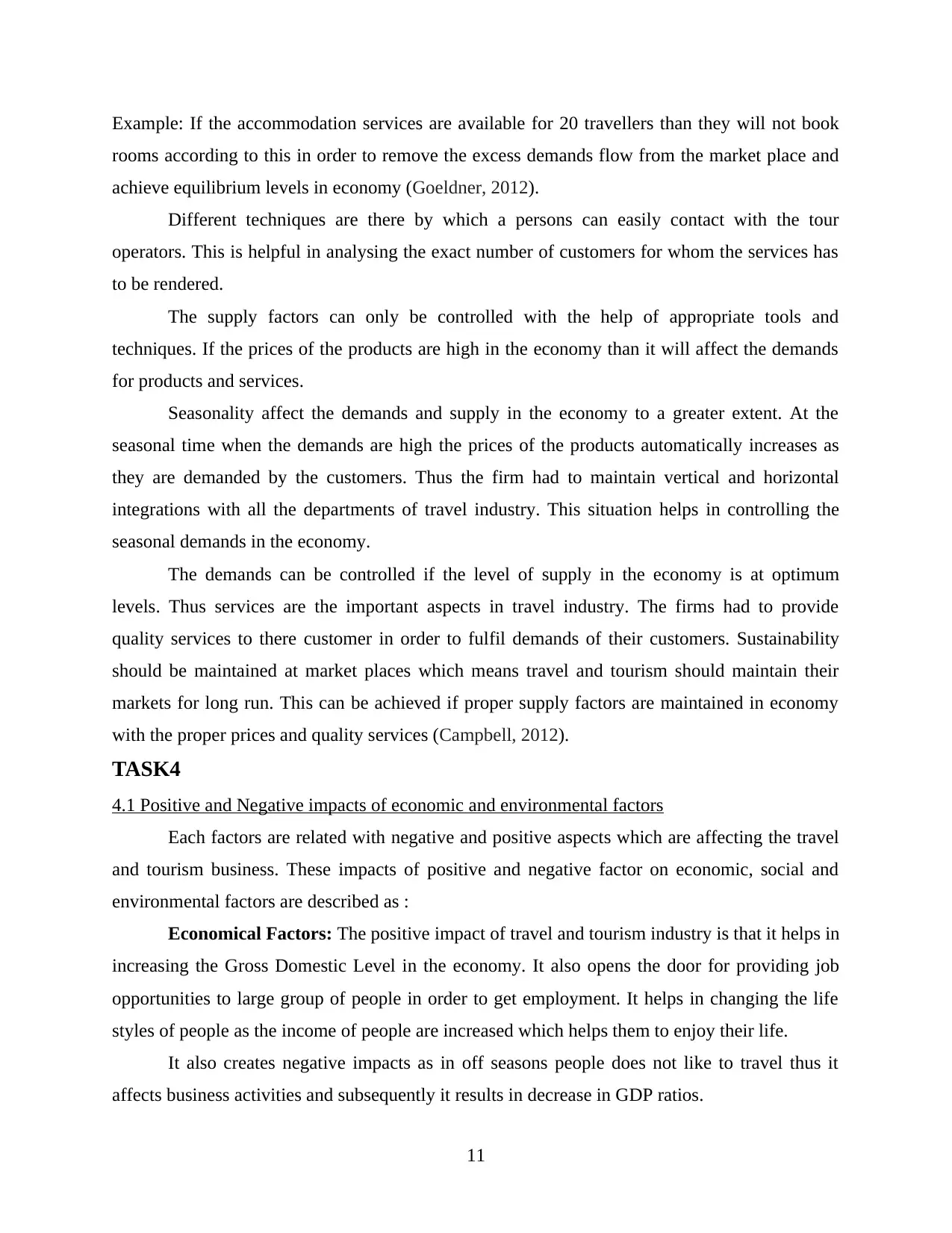
Example: If the accommodation services are available for 20 travellers than they will not book
rooms according to this in order to remove the excess demands flow from the market place and
achieve equilibrium levels in economy (Goeldner, 2012).
Different techniques are there by which a persons can easily contact with the tour
operators. This is helpful in analysing the exact number of customers for whom the services has
to be rendered.
The supply factors can only be controlled with the help of appropriate tools and
techniques. If the prices of the products are high in the economy than it will affect the demands
for products and services.
Seasonality affect the demands and supply in the economy to a greater extent. At the
seasonal time when the demands are high the prices of the products automatically increases as
they are demanded by the customers. Thus the firm had to maintain vertical and horizontal
integrations with all the departments of travel industry. This situation helps in controlling the
seasonal demands in the economy.
The demands can be controlled if the level of supply in the economy is at optimum
levels. Thus services are the important aspects in travel industry. The firms had to provide
quality services to there customer in order to fulfil demands of their customers. Sustainability
should be maintained at market places which means travel and tourism should maintain their
markets for long run. This can be achieved if proper supply factors are maintained in economy
with the proper prices and quality services (Campbell, 2012).
TASK4
4.1 Positive and Negative impacts of economic and environmental factors
Each factors are related with negative and positive aspects which are affecting the travel
and tourism business. These impacts of positive and negative factor on economic, social and
environmental factors are described as :
Economical Factors: The positive impact of travel and tourism industry is that it helps in
increasing the Gross Domestic Level in the economy. It also opens the door for providing job
opportunities to large group of people in order to get employment. It helps in changing the life
styles of people as the income of people are increased which helps them to enjoy their life.
It also creates negative impacts as in off seasons people does not like to travel thus it
affects business activities and subsequently it results in decrease in GDP ratios.
11
rooms according to this in order to remove the excess demands flow from the market place and
achieve equilibrium levels in economy (Goeldner, 2012).
Different techniques are there by which a persons can easily contact with the tour
operators. This is helpful in analysing the exact number of customers for whom the services has
to be rendered.
The supply factors can only be controlled with the help of appropriate tools and
techniques. If the prices of the products are high in the economy than it will affect the demands
for products and services.
Seasonality affect the demands and supply in the economy to a greater extent. At the
seasonal time when the demands are high the prices of the products automatically increases as
they are demanded by the customers. Thus the firm had to maintain vertical and horizontal
integrations with all the departments of travel industry. This situation helps in controlling the
seasonal demands in the economy.
The demands can be controlled if the level of supply in the economy is at optimum
levels. Thus services are the important aspects in travel industry. The firms had to provide
quality services to there customer in order to fulfil demands of their customers. Sustainability
should be maintained at market places which means travel and tourism should maintain their
markets for long run. This can be achieved if proper supply factors are maintained in economy
with the proper prices and quality services (Campbell, 2012).
TASK4
4.1 Positive and Negative impacts of economic and environmental factors
Each factors are related with negative and positive aspects which are affecting the travel
and tourism business. These impacts of positive and negative factor on economic, social and
environmental factors are described as :
Economical Factors: The positive impact of travel and tourism industry is that it helps in
increasing the Gross Domestic Level in the economy. It also opens the door for providing job
opportunities to large group of people in order to get employment. It helps in changing the life
styles of people as the income of people are increased which helps them to enjoy their life.
It also creates negative impacts as in off seasons people does not like to travel thus it
affects business activities and subsequently it results in decrease in GDP ratios.
11
Paraphrase This Document
Need a fresh take? Get an instant paraphrase of this document with our AI Paraphraser
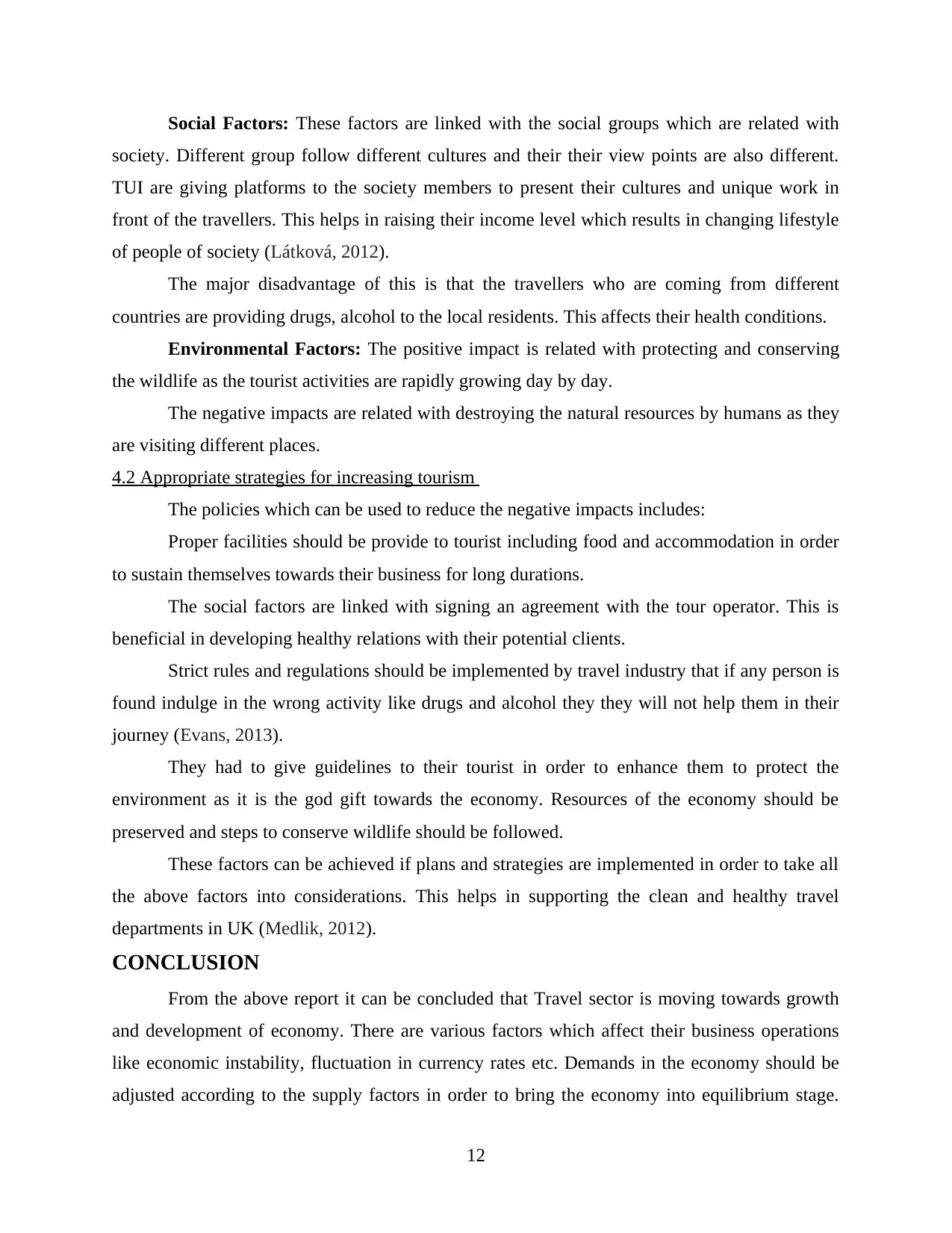
Social Factors: These factors are linked with the social groups which are related with
society. Different group follow different cultures and their their view points are also different.
TUI are giving platforms to the society members to present their cultures and unique work in
front of the travellers. This helps in raising their income level which results in changing lifestyle
of people of society (Látková, 2012).
The major disadvantage of this is that the travellers who are coming from different
countries are providing drugs, alcohol to the local residents. This affects their health conditions.
Environmental Factors: The positive impact is related with protecting and conserving
the wildlife as the tourist activities are rapidly growing day by day.
The negative impacts are related with destroying the natural resources by humans as they
are visiting different places.
4.2 Appropriate strategies for increasing tourism
The policies which can be used to reduce the negative impacts includes:
Proper facilities should be provide to tourist including food and accommodation in order
to sustain themselves towards their business for long durations.
The social factors are linked with signing an agreement with the tour operator. This is
beneficial in developing healthy relations with their potential clients.
Strict rules and regulations should be implemented by travel industry that if any person is
found indulge in the wrong activity like drugs and alcohol they they will not help them in their
journey (Evans, 2013).
They had to give guidelines to their tourist in order to enhance them to protect the
environment as it is the god gift towards the economy. Resources of the economy should be
preserved and steps to conserve wildlife should be followed.
These factors can be achieved if plans and strategies are implemented in order to take all
the above factors into considerations. This helps in supporting the clean and healthy travel
departments in UK (Medlik, 2012).
CONCLUSION
From the above report it can be concluded that Travel sector is moving towards growth
and development of economy. There are various factors which affect their business operations
like economic instability, fluctuation in currency rates etc. Demands in the economy should be
adjusted according to the supply factors in order to bring the economy into equilibrium stage.
12
society. Different group follow different cultures and their their view points are also different.
TUI are giving platforms to the society members to present their cultures and unique work in
front of the travellers. This helps in raising their income level which results in changing lifestyle
of people of society (Látková, 2012).
The major disadvantage of this is that the travellers who are coming from different
countries are providing drugs, alcohol to the local residents. This affects their health conditions.
Environmental Factors: The positive impact is related with protecting and conserving
the wildlife as the tourist activities are rapidly growing day by day.
The negative impacts are related with destroying the natural resources by humans as they
are visiting different places.
4.2 Appropriate strategies for increasing tourism
The policies which can be used to reduce the negative impacts includes:
Proper facilities should be provide to tourist including food and accommodation in order
to sustain themselves towards their business for long durations.
The social factors are linked with signing an agreement with the tour operator. This is
beneficial in developing healthy relations with their potential clients.
Strict rules and regulations should be implemented by travel industry that if any person is
found indulge in the wrong activity like drugs and alcohol they they will not help them in their
journey (Evans, 2013).
They had to give guidelines to their tourist in order to enhance them to protect the
environment as it is the god gift towards the economy. Resources of the economy should be
preserved and steps to conserve wildlife should be followed.
These factors can be achieved if plans and strategies are implemented in order to take all
the above factors into considerations. This helps in supporting the clean and healthy travel
departments in UK (Medlik, 2012).
CONCLUSION
From the above report it can be concluded that Travel sector is moving towards growth
and development of economy. There are various factors which affect their business operations
like economic instability, fluctuation in currency rates etc. Demands in the economy should be
adjusted according to the supply factors in order to bring the economy into equilibrium stage.
12
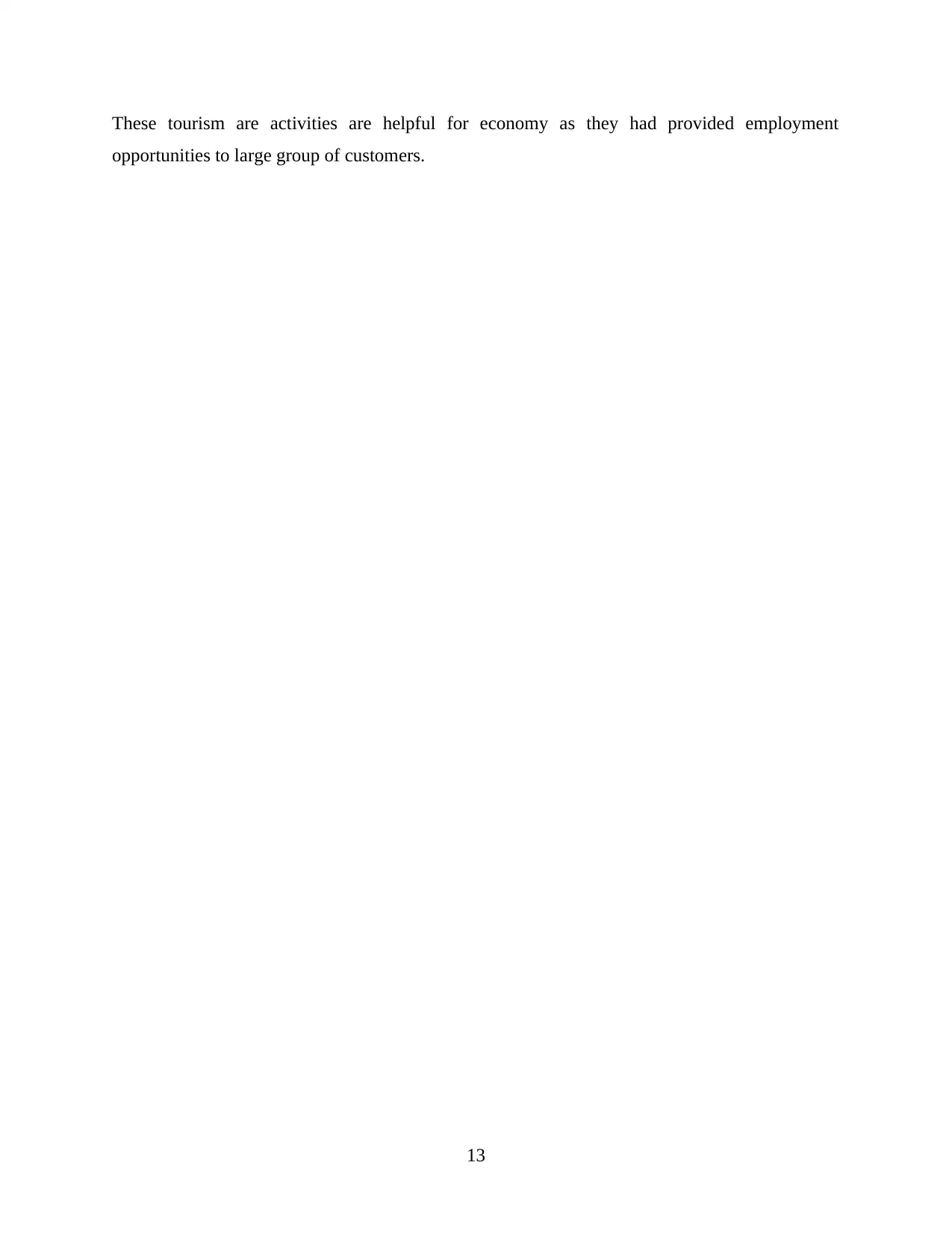
These tourism are activities are helpful for economy as they had provided employment
opportunities to large group of customers.
13
opportunities to large group of customers.
13
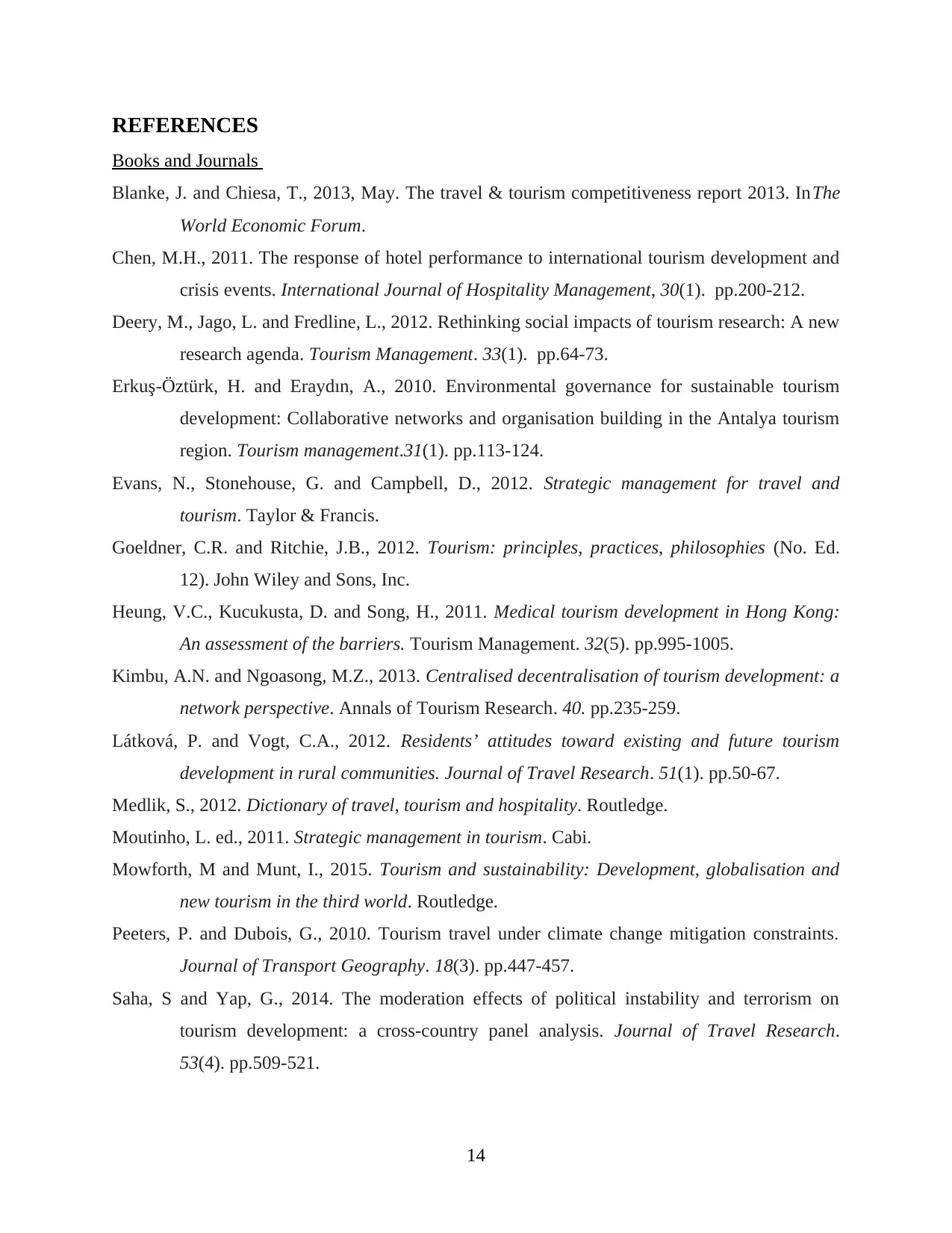
REFERENCES
Books and Journals
Blanke, J. and Chiesa, T., 2013, May. The travel & tourism competitiveness report 2013. InThe
World Economic Forum.
Chen, M.H., 2011. The response of hotel performance to international tourism development and
crisis events. International Journal of Hospitality Management, 30(1). pp.200-212.
Deery, M., Jago, L. and Fredline, L., 2012. Rethinking social impacts of tourism research: A new
research agenda. Tourism Management. 33(1). pp.64-73.
Erkuş-Öztürk, H. and Eraydın, A., 2010. Environmental governance for sustainable tourism
development: Collaborative networks and organisation building in the Antalya tourism
region. Tourism management.31(1). pp.113-124.
Evans, N., Stonehouse, G. and Campbell, D., 2012. Strategic management for travel and
tourism. Taylor & Francis.
Goeldner, C.R. and Ritchie, J.B., 2012. Tourism: principles, practices, philosophies (No. Ed.
12). John Wiley and Sons, Inc.
Heung, V.C., Kucukusta, D. and Song, H., 2011. Medical tourism development in Hong Kong:
An assessment of the barriers. Tourism Management. 32(5). pp.995-1005.
Kimbu, A.N. and Ngoasong, M.Z., 2013. Centralised decentralisation of tourism development: a
network perspective. Annals of Tourism Research. 40. pp.235-259.
Látková, P. and Vogt, C.A., 2012. Residents’ attitudes toward existing and future tourism
development in rural communities. Journal of Travel Research. 51(1). pp.50-67.
Medlik, S., 2012. Dictionary of travel, tourism and hospitality. Routledge.
Moutinho, L. ed., 2011. Strategic management in tourism. Cabi.
Mowforth, M and Munt, I., 2015. Tourism and sustainability: Development, globalisation and
new tourism in the third world. Routledge.
Peeters, P. and Dubois, G., 2010. Tourism travel under climate change mitigation constraints.
Journal of Transport Geography. 18(3). pp.447-457.
Saha, S and Yap, G., 2014. The moderation effects of political instability and terrorism on
tourism development: a cross-country panel analysis. Journal of Travel Research.
53(4). pp.509-521.
14
Books and Journals
Blanke, J. and Chiesa, T., 2013, May. The travel & tourism competitiveness report 2013. InThe
World Economic Forum.
Chen, M.H., 2011. The response of hotel performance to international tourism development and
crisis events. International Journal of Hospitality Management, 30(1). pp.200-212.
Deery, M., Jago, L. and Fredline, L., 2012. Rethinking social impacts of tourism research: A new
research agenda. Tourism Management. 33(1). pp.64-73.
Erkuş-Öztürk, H. and Eraydın, A., 2010. Environmental governance for sustainable tourism
development: Collaborative networks and organisation building in the Antalya tourism
region. Tourism management.31(1). pp.113-124.
Evans, N., Stonehouse, G. and Campbell, D., 2012. Strategic management for travel and
tourism. Taylor & Francis.
Goeldner, C.R. and Ritchie, J.B., 2012. Tourism: principles, practices, philosophies (No. Ed.
12). John Wiley and Sons, Inc.
Heung, V.C., Kucukusta, D. and Song, H., 2011. Medical tourism development in Hong Kong:
An assessment of the barriers. Tourism Management. 32(5). pp.995-1005.
Kimbu, A.N. and Ngoasong, M.Z., 2013. Centralised decentralisation of tourism development: a
network perspective. Annals of Tourism Research. 40. pp.235-259.
Látková, P. and Vogt, C.A., 2012. Residents’ attitudes toward existing and future tourism
development in rural communities. Journal of Travel Research. 51(1). pp.50-67.
Medlik, S., 2012. Dictionary of travel, tourism and hospitality. Routledge.
Moutinho, L. ed., 2011. Strategic management in tourism. Cabi.
Mowforth, M and Munt, I., 2015. Tourism and sustainability: Development, globalisation and
new tourism in the third world. Routledge.
Peeters, P. and Dubois, G., 2010. Tourism travel under climate change mitigation constraints.
Journal of Transport Geography. 18(3). pp.447-457.
Saha, S and Yap, G., 2014. The moderation effects of political instability and terrorism on
tourism development: a cross-country panel analysis. Journal of Travel Research.
53(4). pp.509-521.
14
Secure Best Marks with AI Grader
Need help grading? Try our AI Grader for instant feedback on your assignments.
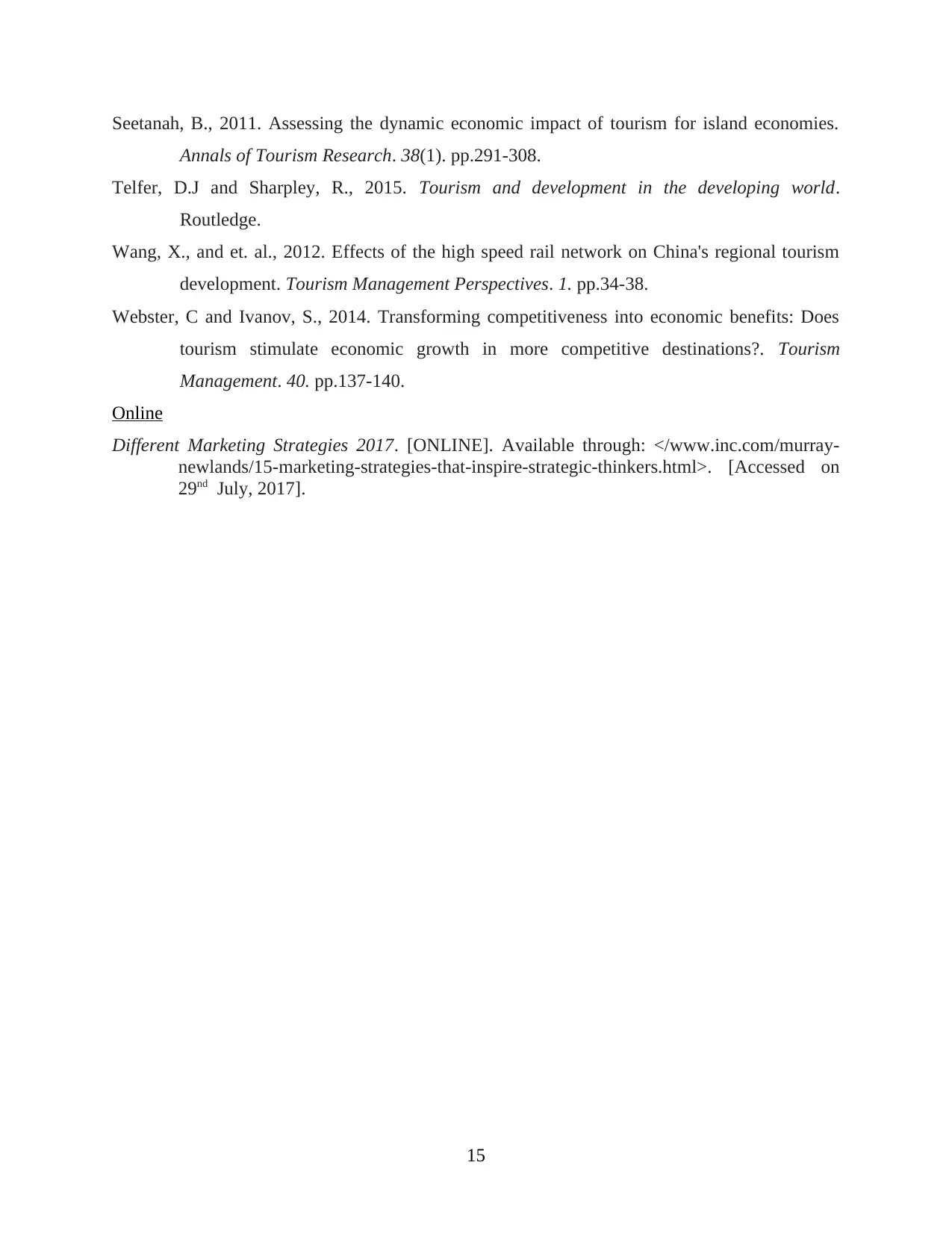
Seetanah, B., 2011. Assessing the dynamic economic impact of tourism for island economies.
Annals of Tourism Research. 38(1). pp.291-308.
Telfer, D.J and Sharpley, R., 2015. Tourism and development in the developing world.
Routledge.
Wang, X., and et. al., 2012. Effects of the high speed rail network on China's regional tourism
development. Tourism Management Perspectives. 1. pp.34-38.
Webster, C and Ivanov, S., 2014. Transforming competitiveness into economic benefits: Does
tourism stimulate economic growth in more competitive destinations?. Tourism
Management. 40. pp.137-140.
Online
Different Marketing Strategies 2017. [ONLINE]. Available through: </www.inc.com/murray-
newlands/15-marketing-strategies-that-inspire-strategic-thinkers.html>. [Accessed on
29nd July, 2017].
15
Annals of Tourism Research. 38(1). pp.291-308.
Telfer, D.J and Sharpley, R., 2015. Tourism and development in the developing world.
Routledge.
Wang, X., and et. al., 2012. Effects of the high speed rail network on China's regional tourism
development. Tourism Management Perspectives. 1. pp.34-38.
Webster, C and Ivanov, S., 2014. Transforming competitiveness into economic benefits: Does
tourism stimulate economic growth in more competitive destinations?. Tourism
Management. 40. pp.137-140.
Online
Different Marketing Strategies 2017. [ONLINE]. Available through: </www.inc.com/murray-
newlands/15-marketing-strategies-that-inspire-strategic-thinkers.html>. [Accessed on
29nd July, 2017].
15
1 out of 17
Related Documents
Your All-in-One AI-Powered Toolkit for Academic Success.
+13062052269
info@desklib.com
Available 24*7 on WhatsApp / Email
![[object Object]](/_next/static/media/star-bottom.7253800d.svg)
Unlock your academic potential
© 2024 | Zucol Services PVT LTD | All rights reserved.




